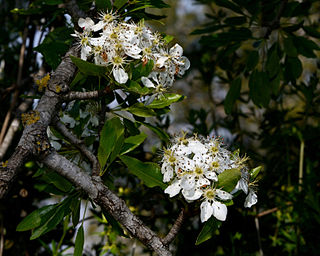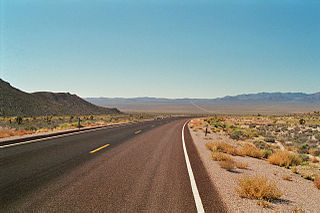
The flora and fauna of Andorra are similar to that found elsewhere in the Pyrenees.

The flora and fauna of Andorra are similar to that found elsewhere in the Pyrenees.
Chestnut and walnut trees grow only in the area around Sant Julià de Lòria, the lowest settlement. Elsewhere, evergreen oaks are still common. Higher regions and many valleys have pines, firs, and various forms of subalpine and alpine plant life. At the highest altitudes there are no trees, but grass is plentiful during the summer. There are carnations, violets, bellflowers, and daisies, as well as blackberries, wild strawberries, and moss. [1]
Bears, wolves, foxes, martens, Pyrenean chamois, rabbits, hares, eagles, vultures, wild ducks, and geese may be found in isolated areas. The mountain streams contain trout, pike, and crayfish. [2]

Landscaping refers to any activity that modifies the visible features of an area of land, including:

Malesia is a biogeographical region straddling the Equator and the boundaries of the Indomalayan and Australasian realms, and also a phytogeographical floristic region in the Paleotropical Kingdom. It has been given different definitions. The World Geographical Scheme for Recording Plant Distributions split off Papuasia in its 2001 version.

Garrigue or phrygana is a type of low, soft-leaved scrubland ecoregion and plant community in the Mediterranean forests, woodlands, and scrub biome.

Bükk National Park is a national park in the Bükk Mountains of Northern Hungary, near Miskolc. It was founded in 1976 as the third national park in the country. It contains 431.3 km². Mountainous and forested, Bükk is Hungary's largest national park and is situated in the northern mountains, between Szilvásvárad and Lillafüred. Bükk's important geological features include various karst formations within its limestone mountains - particularly caves, swallow-holes, and ravines. The country's longest and deepest cave, Istvánlápa, is located in the park. Bükk National Park also contains ninety species of nesting birds, some considered endangered.

Kelimutu National Park is located on the island of Flores, East Nusa Tenggara, Indonesia. It consists of a region with hills and mountains, with Mount Kelibara as its highest peak. Mount Kelimutu, which has the three coloured lakes, is also located in this national park. This natural attraction is a destination for tourists.
Wildlife of Azerbaijan consists of its flora and fauna and their natural habitats.

Cassine laneana, commonly known as the Bermuda olivewood, is a species of large tree in the staff vine family, Celastraceae, that is endemic to the islands of Bermuda. Although once found in the extensive subtropical coniferous forests that covered the islands, it is currently restricted to small protected areas, such as Spittal Pond. C. laneana can grow anywhere from 25 to 40 feet tall, with leaves that are 1 to 2.5 inches long and 0.5 to 1.5 inches wide. The leaves are also a deep green colour when they are older and a bright green colour when they are younger. C. laneana flowers in late spring and early summer and produces a small ovate berry that is an olive colour and 0.25 to 0.5 inches long.

Protea comptonii, also known as saddleback sugarbush, is a smallish tree of the genus Protea in the family Proteaceae. It is found in South Africa and Eswatini.

Lake Kreda is a man-made lake in the Radovna Valley in northwestern Slovenia. The lake got its name from the chalk that was mined in the area until 1985. The digging also created a basin, which gradually filled with water and the lake appeared. The mining ceased because it was unprofitable and due to conservation concerns, but the lake remained and is now occasionally used as a recreation site.

The Knuckles Mountain Range lies in central Sri Lanka, in the Districts of Matale and Kandy. The range takes its name from a series of recumbent folds and peaks in the west of the massif which resemble the knuckles of clenched fist when viewed from certain locations in the Kandy District. Whilst this name was assigned by early British surveyors, the Sinhalese residents have traditionally referred to the area as Dumbara Kanduvetiya meaning Mist-laden Mountain Range.

Totteridge Common is a 3.7 hectare Site of Borough Importance for Nature Conservation, Grade II, in Totteridge in the London Borough of Barnet. The nature reserve is the southern verge of the road Totteridge Common, between Totteridge Park and Oak Lodge. It is registered common land owned by the Totteridge Manor Association and comprised the lands of the former Manor of Totteridge which were transferred to the association in 1954.

Melochia umbellata is a species of flowering plant in the mallow family, Malvaceae. Its specific epithet comes from the Latin umbellatus (umbel-like), referring to the inflorescence.

Pyrus syriaca is a deciduous tree in the Rosaceae family. It is referred to by the common name Syrian pear. It is the only pear species which grows in the wild in Lebanon, Turkey, Syria and Israel.

Tikaboo Valley is a valley in Lincoln County, Nevada, United States. Its geographical coordinates are 37.1563494 and -115.4016881. It has an elevation of 3,793 feet or 1,156 meters.

Centaurea horrida is a species of the genus Centaurea which is only found growing in Sardinia and associated islands. Due to their limited ability to disperse, they are isolated from other environments, and have a very low colonizing ability.

Markhamia obtusifolia is a species of plant in the family Bignoniaceae. It is found in Southern Africa.

Zacharovanyi Krai National Nature Park is one of the National Parks in Ukraine, located in Zakarpattia Oblast in the country's southwest. It was established in 2009 and covers an area of 6,101 ha (61.01 km2). The park has its headquarters in the town of Irshava, Irshava Raion.

Garcinia subelliptica, the happiness tree, or Fukugi tree is a species of Garcinia found in the coastal forest of Philippines, Sri Lanka, Taiwan, Indonesia (Java) and Japan
| This Andorra-related article is a stub. You can help Wikipedia by expanding it. |